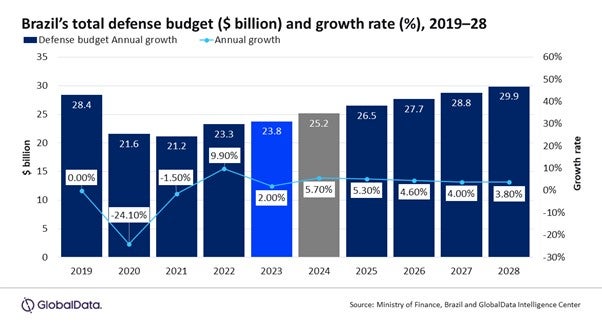Amidst growing security concerns, Brazil is set to bolster its defence capabilities with a projected budget of $29.9bn (146.5bn reais) by 2028, driven by modernisation initiatives.
GlobalData's Brazil Defense Market 2023-2028 report unveils investments across the Brazilian Army, Navy, and Air Force, positioning the nation as a key player in regional security.
The Brazilian government's commitment to fortifying its borders, protecting the Amazon rainforest, and harnessing offshore oil discoveries has catalysed a surge in defence investments. According to GlobalData's recent report, titled "Brazil Defense Market Size and Trends, Budget Allocation, Regulations, Key Acquisitions, Competitive Landscape and Forecast, 2023-28."
Brazil's defence expenditure is forecasted to rise from $25.3bn in 2024 to $29.9bn by 2028, registering a compound annual growth rate (CAGR) of 4.4% between 2024 and 2028.

The Brazilian Army stands at the forefront of this modernisation drive, with plans to acquire 36 self-propelled howitzers through the VBC OAP 155mm SR program. Simultaneously, ageing armoured vehicles are set to undergo upgrades with IVECO's VBTP-MR Guarani.
The Brazilian Air Force is enhancing its capabilities with increased orders of F-39 E/F Gripen fighter jets from Saab AB and the acquisition of KC-390s from Embraer. These developments mark strides in fortifying air capabilities and replacing ageing C-130s.
Rouble, Aerospace and Defence Analyst at GlobalData, emphasises Brazil's focus on military and cyber capabilities. He notes, "The acquisition of advanced platforms positions Brazil to address a broad spectrum of security threats, from traditional aerial defence to emerging challenges in the cyber domain."
Many defence platforms are domestically manufactured, supporting Brazil's industries, generating employment, and boosting the economy.
Brazil is embarking on a modernisation plan in the naval domain, with submarines leading the way, and is expected to accumulate a value of $1.8bn over 2023-2028. The Navy's 20-year plan includes procuring various vessels, a surveillance system, logistical support ships, and the local construction of Brazil's first nuclear-powered submarine, SN Álvaro Alberto.
Rouble concludes, "As Brazil seeks to project influence beyond its borders, safeguard strategic sea lanes, and counter transnational organised crime, the comprehensive modernisation efforts across its armed forces underscore a forward-looking approach. This not only strengthens Brazil's defence posture but also positions the country as a significant contributor to regional security and stability."











